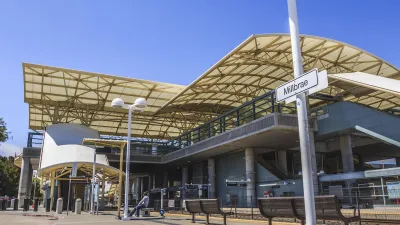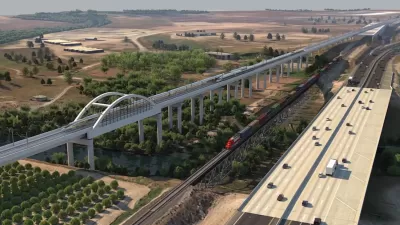The China Railway International Group, working with the Chinese Export-Import Bank, responded to the California High-Speed Rail Authority's "expressions of interest." They teamed up with China Development Bank to beat out the Japanese in Indonesia.

"A team of Chinese firms, along with the Export-Import Bank of China, wants to build and finance a large part of California’s proposed 800-mile high-speed rail project," writes Robin Respaut for Reuters. "The firms expressed their interest last month in a 23-page document sent to the California High-Speed Rail Authority."
China Railway International Group had responded to the rail authority's request to "private companies from around the globe to help shape the state's strategy to launch the first stage of its train line, considered the most ambitious infrastructure project in the United States," writes Respaut.
An Oct. 2 AP article by Juliet Williams indicates that the authority received responses from 35 companies (pdf) who are interested in building the controversial San Francisco to Los Angeles line.
The group may have a leg up on the competition as it "proposed financing from the Export-Import Bank of China."
According to China Exim's website, "The Bank's main mandate is to facilitate the export and import of Chinese mechanical and electronic products, complete sets of equipment and new- and high-tech products, assist Chinese companies with comparative advantages in their offshore project contracting and outbound investment, and promote international economic cooperation and trade."
On Friday, the chairman of the China Railway International Group also signed a $5.5 billion deal "to build the first high-speed railway in Southeast Asia's top economy," Indonesia, beating out Japan, according to an AFP article.
Seventy-five percent of the funding will come from the China Development Bank, "with the rest coming from the Chinese railway company and Indonesian consortium."
The line will connect the Indonesian capital Jakarta with the mountain-fringed city of Bandung, some 160 kilometres (100 miles) away, and is a key part of President Joko Widodo's plans to overhaul the archipelago's infrastructure and attract investors.
Japan was long expected to build the railway but China entered the contest earlier this year, and Tokyo's bid was rejected last month after a chaotic bidding process that infuriated the Japanese.
China Development Bank "could revolutionize development funding in the U.S.," as noted here in a 2012 post on funding a massive San Francisco development.
China Railway International also entered into an agreement last month with America's XpressWest Enterprises LLC, the company building the Victorville, Calif. to Las Vegas privately funded high-speed rail line.
However, Williams and Justin Pritchard throw some cold water on the California project, writing that businesses are questioning whether sufficient funding is available for the high-speed rail project.
FULL STORY: Chinese firms want to build, finance California high-speed train

Planetizen Federal Action Tracker
A weekly monitor of how Trump’s orders and actions are impacting planners and planning in America.

Maui's Vacation Rental Debate Turns Ugly
Verbal attacks, misinformation campaigns and fistfights plague a high-stakes debate to convert thousands of vacation rentals into long-term housing.

Restaurant Patios Were a Pandemic Win — Why Were They so Hard to Keep?
Social distancing requirements and changes in travel patterns prompted cities to pilot new uses for street and sidewalk space. Then it got complicated.

In California Battle of Housing vs. Environment, Housing Just Won
A new state law significantly limits the power of CEQA, an environmental review law that served as a powerful tool for blocking new development.

Boulder Eliminates Parking Minimums Citywide
Officials estimate the cost of building a single underground parking space at up to $100,000.

Orange County, Florida Adopts Largest US “Sprawl Repair” Code
The ‘Orange Code’ seeks to rectify decades of sprawl-inducing, car-oriented development.
Urban Design for Planners 1: Software Tools
This six-course series explores essential urban design concepts using open source software and equips planners with the tools they need to participate fully in the urban design process.
Planning for Universal Design
Learn the tools for implementing Universal Design in planning regulations.
Heyer Gruel & Associates PA
JM Goldson LLC
Custer County Colorado
City of Camden Redevelopment Agency
City of Astoria
Transportation Research & Education Center (TREC) at Portland State University
Jefferson Parish Government
Camden Redevelopment Agency
City of Claremont





























